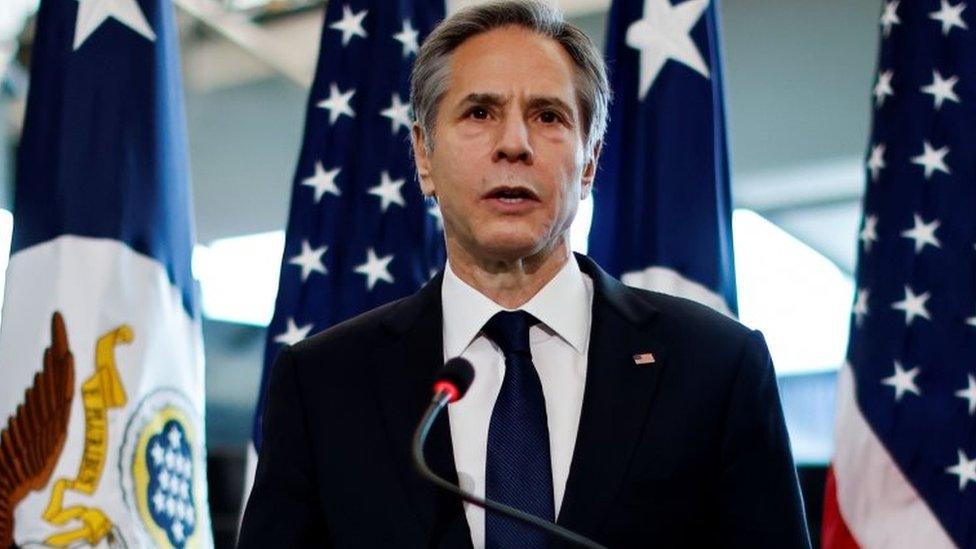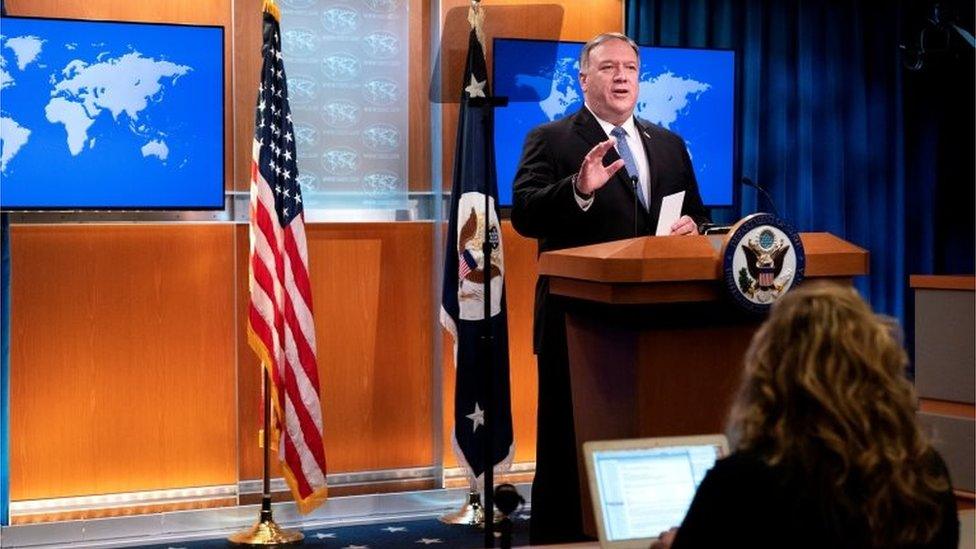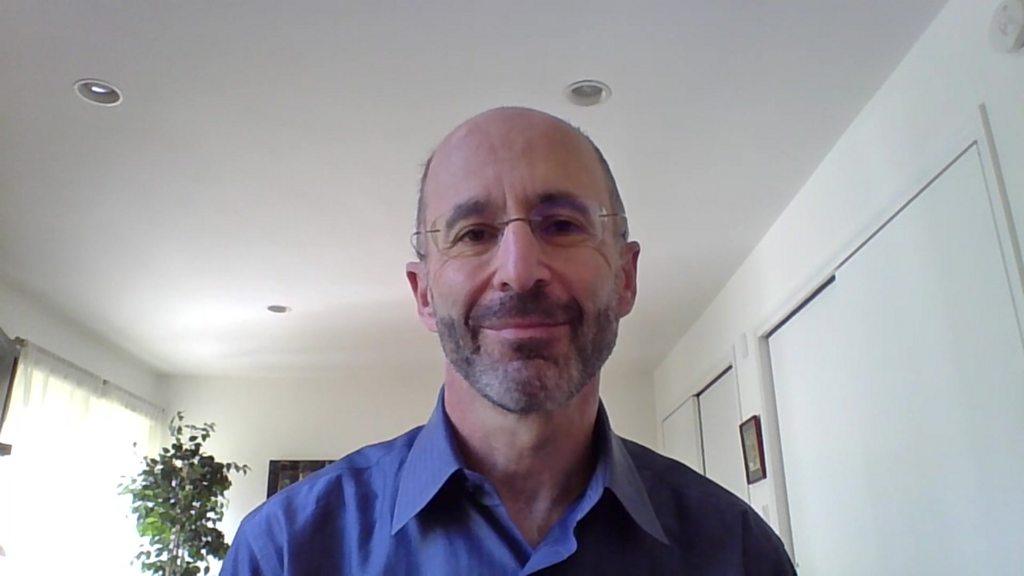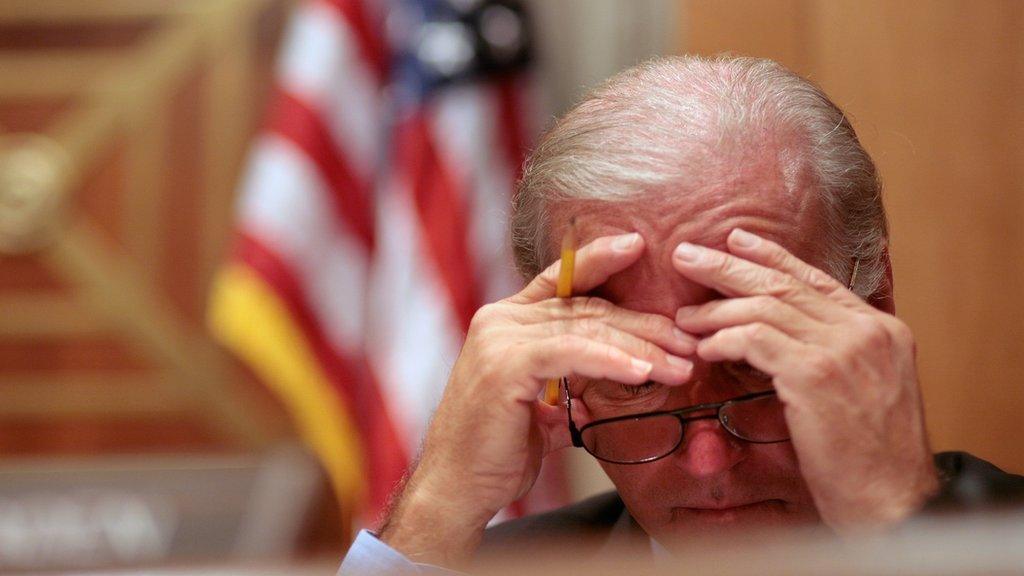Antony Blinken: Who is America's new top diplomat?
- Published

Antony Blinken is a veteran diplomat who's on home turf in the department
This is the third time I've witnessed a new secretary of state enter the building.
For Donald Trump's envoys - Rex Tillerson and Mike Pompeo - the lobby was packed, infused with a mixture of apprehension and hope.
For Antony Blinken, the lobby was nearly empty because of Covid protocols - but the absent presence of the diplomatic corps was infused with a sense of relief.
"People are very very happy about [Blinken's] arrival and the departure of the previous team," said a state department official who'd been texting his colleagues while watching from home.
Blinken is a veteran diplomat who's on home turf in the department, but "a lot has changed," he said in understatement, promising to restore trust and morale.
About 1,000 employees left during the Trump years. Many who remained felt sidelined by the undiplomatic approach of the former president, frustrated by the mismanagement of Tillerson and alienated by the politics of Pompeo, a relentless Trump loyalist.
"Everyone is pleased that we'll have a different face to the world," said the official. "Everyone's trying to get back in game shape after four years of the Trump era."
The faces lining the corridor outside the press pen have already changed: photographs of Pompeo at work replaced by pictures of a variety of secretaries of state.
And a giant billboard showcasing a "professional ethos" statement developed by Pompeo was toppled shortly after Joe Biden took his inaugural oath.
America's new top diplomat has decades of foreign policy experience and expertise, including so many years advising Biden that the two men are said to have a "mind-meld".
He's embedded in Washington culture - even dabbling in the DC "wonk rock" musical scene (he posts his recordings as ABlinken. Get it?)
Robert Malley is a school friend of Antony Blinken
At his confirmation hearing, the mild-mannered technocrat talked in such measured tones about rewriting Trump foreign policy that he got strong bipartisan support.
Senators seemed eager to leave a confrontational "America First" approach behind them.
Blinken has promised a harder line in response to Russian cyber-attacks and election meddling, an end to support for Saudi airstrikes in Yemen, and a review of the Trump administration's decision to designate Yemen's Houthi rebels as a terrorist organisation, because this could undermine humanitarian aid.
On Iran, Blinken has repeated Biden's pledge to rejoin the 2015 nuclear deal if Tehran resumes its commitments, but cautions this won't happen quickly.
And on China, he's agreed with Trump's tougher tone - just not the approach. The better way is to tackle Beijing together with democratic allies and through international institutions that Trump dumped, he says.
His mission is to restore American leadership in that way.
But at his inaugural news conference journalists asked how allies could trust the US after such stark swings in administrations.
The desire to have America back at the table was almost "palpable" in calls with counterparts, Blinken declared.
And he made clear that meeting us on his first day was a signal of wanting to work with the press.
That's a shift in tone.

Mike Pompeo, Blinken's predecessor, had wanted to put the "swagger" back in the department
Pompeo, like his boss, was dismissive of the mainstream media, and spent his final days railing at it.
We struggled to get answers to our email enquiries from a communications team that was sometimes empowered to say little more than the equivalent of "off the record I have nothing to say".
Blinken's low-key style is also quite a shift from Pompeo's vow to put the "swagger" back in the department, and will be competing with the larger than life personalities of special envoys such as John Kerry - his former boss and Biden's point man on climate.
But Blinken has a personality of his own, shaped by his life story.
He talks of how his grandfather found refuge in America after fleeing pogroms in Russia, and how his Polish stepfather escaped a Nazi death march to be rescued by an American GI.
"That's who we are," he likes to say. "That's what we represent to the world, however imperfectly, and what we can still be at our best."
Convincing the rest of the world that that America exists, is central to how he sees his job.
Related topics
- Published24 November 2020

- Published22 January 2021
- Published18 November 2020
